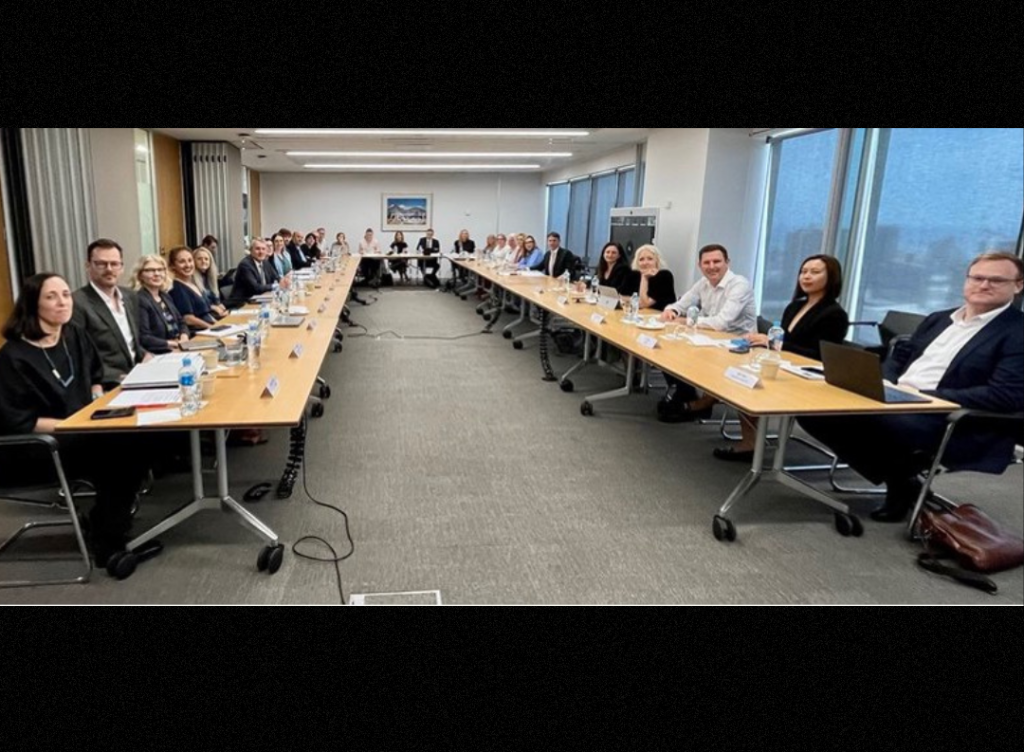Sitting at the Copyright Roundtable

Following on from the Federal Government’s launch of National Cultural Policy – Revive: a place for every story, a story for every place (Revive Policy), Arts Law continues to advocate for creators and creative organisations.
On 23 February 2023, Arts Law’s Katherine Giles attended the inaugural Ministerial Roundtable on Copyright chaired by the Attorney-General The Hon Mark Dreyfus KC MP, in Melbourne. The 30 organisations invited to attend represented the publishing, broadcasting, screen, education, music, research, gaming, technology, cultural collections, collecting societies, and organisations such as Arts Law and the Australian Copyright Council. The Attorney-General aims to develop practical and achievable copyright reform proposals for Government consideration, which could potentially be taken forward with the support of representative stakeholder organisations attending the Roundtable.
Each organisation was asked to identify up to 3 priority reform issues of particular interest, with the aim of providing a broad overview of the current copyright landscape. This was a great opportunity for Arts Law to outline the most pressing reform issues for Arts Law and the creators and creative organisations we advise and work with.
During Arts Law’s speaking time, Arts Law noted that the new National Cultural Policy speaks to an array of values that Arts Law has been championing for decades, including the introduction of stand-alone Indigenous Cultural and Intellectual Property (ICIP) legislation. Alongside the introduction of this legislation, Arts Law submitted that, when any copyright reforms are introduced, First Nations artists should be consulted and the effect of any copyright reforms on First Nations artists should be assessed.
Arts Law also submitted that whether the Government is considering limitations on the remedies for use of orphan works, amendments to fair dealing exceptions, library and archive or education exceptions, any proposed reforms should not minimise the control that creators have over their work nor diminish each creator’s ability to make an income from their arts practice. This position builds on previous copyright reform submissions Arts Law has made to the Federal Government.
Lastly, Arts Law submitted that alongside any reforms, there needs to be continued funding provided to arts organisations that support artists and in particular First Nations artists. Recent Arts Law submissions have addressed issues of exploitation (from bad licensing arrangements through to working conditions for artists), the resale royalty, and the importance of funding arts and other support organisations who provide critical resources and assistance to artists. For example, continued support for Arts Law’s ‘Licensing the Right Way’ initiative ensures that First Nations artists are able to protect their work and livelihoods by securing better licensing outcomes.
The participants raised a variety of topics. However overall, the top five topics discussed by the organisations attending the Roundtable included:
- A limited liability scheme for the use of orphan works (that is, where the copyright owner of a work cannot be found).
- The implications of AI such as text and data mining, database protection and authorship of AI-created works for copyright law.
- The use of copyright material in remote learning environments.
- The use of quotations from copyright material.
- The definition of ‘broadcast’ for the purposes of the Copyright Act given the current link with the definition in the Broadcasting Services Act.
The participating stakeholder organisations also voiced strong support for the Federal Government’s National Cultural Policy and the commitment to introduce stand-alone legislation to protect ICIP.
While there were some complexities raised, there was a general consensus and a collaborative ‘vibe’ during the Roundtable. As the Federal Attorney-General tweeted later that day:
‘Australia needs an effective copyright system that keeps pace with new technology while protecting creators & other copyright owners.
Today’s inaugural Ministerial Roundtable on Copyright is the beginning of an industry-wide discussion about what reform is needed.’
The Attorney General thanked all 30 organisations who attended and noted that each organisation had thoughtfully contributed to discussions.
A high-level summary of the summary of the Inaugural Roundtable, including a list of the participants is available here. Further collaborative Copyright Roundtable sessions will be held in 2023, with the next Roundtable to be held in Canberra, likely in May 2023.

